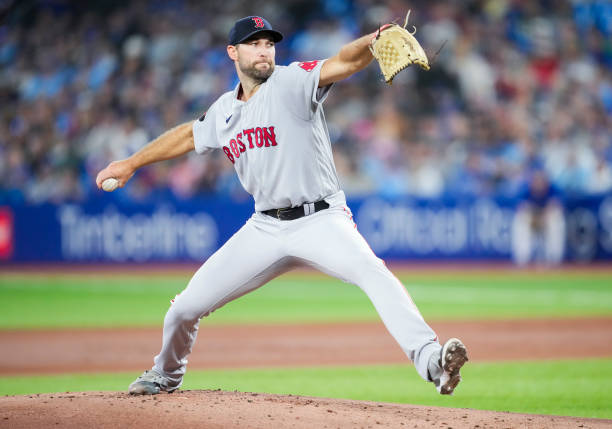Thirty-one-year-old right-hander Michael Wacha is arguably the best free agent starting pitcher remaining in free agency. Wacha has pitched 10 seasons in the big leagues, compiling 1,153 2/3 innings with a 4.05 ERA and 4.07 FIP. He has spent much of his career as a mid-to-bottom of-the-rotation starter. After all, Wacha has only three seasons under his belt in which he pitched 100 innings with an ERA below 4.00. Only twice in his career has he pitched enough innings to qualify for the ERA title. 2022 was one of the best seasons of Wacha’s career, yet still included two IL stints, only 127 1/3 innings pitched, a 3.32 ERA, 4.56 xERA, and 4.14 FIP. It has been reported that Wacha is looking for a two-year deal. While a two-year contract for someone with Wacha’s injury history and performance could be risky, he could also be a steal.
Michael Wacha Seeking A Two-Year Deal https://t.co/FnagM3AXnG pic.twitter.com/chyk2vuClE
— MLB Trade Rumors (@mlbtraderumors) January 28, 2023
The Best Free Agent Starting Pitcher Remaining
2022 Season with the Boston Red Sox
Even at his 2022 level, Michael Wacha can still be a valuable contributor to a contending team. Given a 4.56 xERA, Wacha’s 3.32 ERA in 2022 is due for some regression. However, there are still a lot of positives to take away. If Wacha were to join a contending team, it would be as a fourth or fifth starter. Pitching 127 1/3 innings over 23 starts leads to an average of 5.54 innings per start. As pitchers like Sandy Alcantara, Gerrit Cole, and Zack Wheeler, among others, have shown in recent years, innings matter. Being able to consistently pitch deeper in games is a valuable skill set to have. While Wacha is not on the level of those guys, his ability to pitch deeper into games than most fourth or fifth-starters raises his level even more. Comparatively, Nestor Cortes Jr. pitched 158 1/3 innings over 28 starts, which averages out to 5.65 innings per start.
Yes, Cortes posted a 2.44 ERA and finished eighth in Cy Young voting. However, this goes to show that even some of the best pitchers have not yet shown the ability to consistently pitch deeper into games. Another positive from Wacha’s 2022 season was that he carried a 2.70 ERA and 3.65 FIP through September 22nd. On that day, he allowed three earned runs in a six-inning start against the New York Yankees. In his two following starts, Wacha allowed 11 total runs in 7 1/3 innings. This goes to show how one or two poor starts can alter the entire perception of a pitcher’s season. On the whole, Wacha allowed three earned runs or fewer in 18 of his 23 starts. While not the most advanced statistic, it still shows how consistent he was in 2022.
Diving Deeper
By many measures, 2022 was one of the best seasons of Wacha’s career. Michael Wacha posted a 1.115 WHIP and 127 ERA+, both representing the second-best figures of his career. His 3.35 K/BB and 2.2 BB/9 were the fourth-best and second-best figures of his career, respectively. Moreover, his 7.8 hits allowed per nine innings is also the fourth-best of his career. Dissecting his numbers even more, Wacha’s average fastball velocity in 2022 was 93 MPH. This is just as hard as he was throwing back in 2019. This reflects well for a pitcher who is now in his 30s.
In digging into Wacha’s arsenal, it is clear he made some changes between 2021 and 2022. In 2021, Wacha threw his sinker 3.4% of the time while throwing his cutter 24.9% of the time. However, that changed to 12.6% on his sinker and 17.2% on his cutter. The pitch he threw the most often in 2022 was his fastball, throwing it 33.0% of the time. This represented a decrease from 35.9% in 2021. As far as Wacha’s curveball, his usage of that pitch only ticked up a bit, from 6.3% to 7.4%. What does all this mean? Well, Wacha had more success in 2022 than in 2021 and part of that can be attributed to throwing more secondary pitches. It’s not hard to find the correlation between that and Wacha’s hard-hit rate of 35.4%, which ranked in the sport’s 70th percentile. In 2021, that figure was up to 43%. It looks like throwing more secondary pitches made Wacha more unpredictable, leading batters to produce weaker contact.
A Dominant Changeup
Michael Wacha, Nasty 87mph Changeup…and Sword. ⚔️ pic.twitter.com/1J9xrRn3ED
— Rob Friedman (@PitchingNinja) May 31, 2022
Michael Wacha has one of the best changeups in baseball. There is a lot to support this beyond a simple tweet, but that just goes to show how fooled batters are by the movement on this pitch. In 2022, Wacha allowed a .170 BA, .176 xBA, .314 SLG, .292 xSLG, and .247 xwOBA. It is the pitch that batters struggle with the most when facing Michael Wacha. His changeup produced a -9 run value, which ranked as the 8th-best changeup in the sport. By run value, Wacha’s two best pitches are his changeup and cutter (-6 run value). In addition, his sinker produced a -3 run value, still showing it as an above-average pitch. What this goes to show is that throwing his four-seam fastball less, and balancing the usage between his three other main pitches, produced better results. This can be used as a blueprint moving forward for Wacha and any team that employs him. A further reduction in fastball usage might reap even greater rewards.
Final Thoughts
Michael Wacha has been around for a while but is still only 31 years old. With his velocity still in good shape and his secondary offerings producing good results, Wacha could be a steal on a short-term contract. While he may not be worth the $15 million a year that he’s seeking, it seems like a 2-year deal worth $24 million could end up being a great contract for both Wacha and his employer. Whether he is healthy enough to pitch 160 innings, or ends up at the 120-130 mark like in 2022, Wacha can provide great value to a contending team. Wacha fits best on a team where he can be a backend or sixth starter, but still be relied upon consistently. Some of these teams include the Boston Red Sox, Los Angeles Angels, Los Angeles Dodgers, and even the St. Louis Cardinals.
Main photo:
Embed from Getty Images
Players mentioned:
Michael Wacha, Sandy Alcantara, Gerrit Cole, Zack Wheeler, Nestor Cortes Jr.






